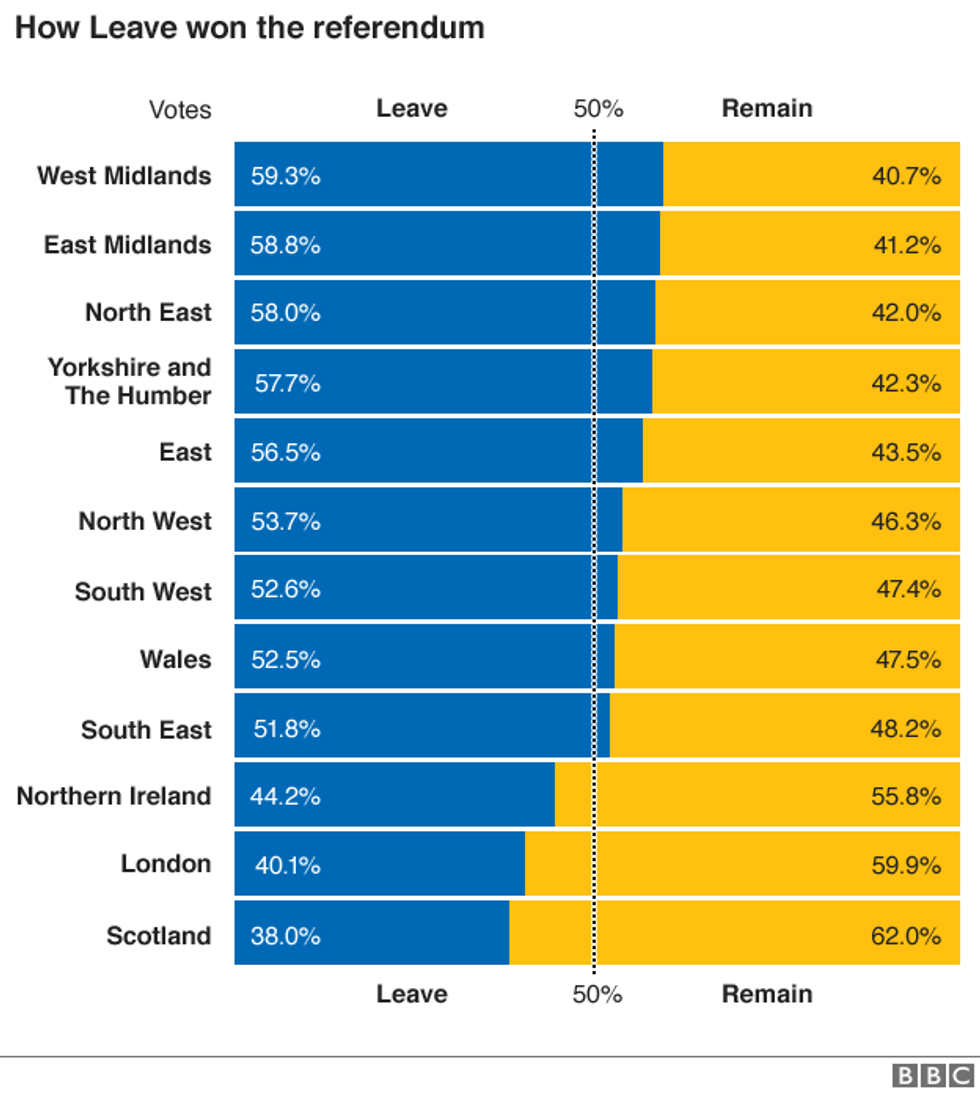If you haven't heard, the United Kingdom has made a monumental decision to leave the European Union. The referendum, being called "Brexit", was passed 52 percent to 48 percent, in favor of leaving the EU, across the whole of the UK, with around 72percent voter turnout. That's the most in voter turnout since 1992!
But if you're like me, most of this was news to you. You might not have been aware that this was even going on in the UK, since we're ramping up for our general election in November. When I heard about this, I was shocked to find that the UK had made the decision to leave, but I didn't have a clue what that meant. Luckily, I did some reading up on the subject so you don't have to! Here's what you need to know about Brexit.
1. What does "Brexit" mean?
Brexit is literally combining "Britain" with the word "exit" to create Brexit. They are the first "nation state" that actually has voted to leave the EU. The only other country that has voted to leave is Greenland in 1982.
2. What is the EU?
The EU stands for the European Union. It's a partnership of 28 countries that work together for economic and political prosperity. It began after World War II with the premise that if two countries were working together, they'd be less likely to fight in a war against each other. The idea is that the countries in the EU are like states and can function as if they were one country. This allows people to move across borders in EU countries easily, while also helping move goods and money.
Members of the EU use the same currency, the euro, which 19 countries currently use. In addition, the EU has it's own parliament. Their parliament passes laws regarding the environment, consumer rights, and other issues across Europe. If you're interested in learning more about what the EU does, here's some more info for you.
3. Who voted to leave? Who voted to stay?
England (as a whole) voted 53.4 percent in favor of leaving the EU. The only part of England that voted with a majority to remain was London (with 59.9 percent wanting to stay). Wales sided with England, voting to stay with 52.5 percent.
In contrast, both Scotland and Northern Ireland voted strongly for staying in the European Union, with 62 percent and 55.8 percent respectively. In fact, Scotland was predominately against leaving the EU and voted the strongest against it in the entire United Kingdom. Interestingly enough, the Prime Minister of England was against leaving the EU as well.
4. Why did citizens of the UK want to leave the EU?
The UK wants to take back their borders from the EU. Because of the free movement between the EU countries, if the UK left they could better control who enters the country. Additionally, there are many who are upset about all the "red tape" that the EU laws create. Evidently there's a lot of overlap between EU laws, UK laws, and even the European Court of Human Rights laws. Not to mention, none of the supporters of leaving the EU want to loose their currency system. Those who wanted to leave are seemingly striving for a more independent UK.
5. Why did citizens of the UK want to stay in the EU?
For one, most businesses find it easier to function within the EU. Thanks to the EU, companies can move money, business, and goods relatively freely between countries that are part of the union. Not to mention that Britain's economy itself gets a lift for the exact same reasons. Proponents of remaining in the EU also argued that the immigrants entering the UK were young, hard-working individuals that would help the country. These same people believe that Britain's world status will be injured if they try to go it alone, as opposed to working with the EU.
6. What now?
So now that the people have voted to leave, the Prime Minister will have to put forward all the legal mumbo jumbo that goes along with leaving the EU. The UK will then begin negotiations with the EU on how they leave the union - this could take up to two years! The negotiations will affect how the UK interacts with the countries in the EU after officially leaving. In the meantime, the UK remains a part of the EU and must abide by treaties and laws in place, but cannot be a part of any decision making.
7. What is Scotland planning to do?
Upon the determination of the Brexit vote, Scotland was rather upset that they had voted to remain in the EU, yet they are being forced to leave because they're a part of the UK. Due to this, it sounds like there will be another Scotland independence vote shortly. With much more political turmoil behind it, I doubt it will end like the last one did.
8. What about Northern Ireland?
Northern Ireland is also upset because they, like Scotland, voted to remain in the EU but are being removed as a part of the UK. They would also like to leave, even proposing reuniting with Ireland. However, it isn't sure yet if they will be able to reunite as one country. Some of it will depend on the outcome of UK negotiations with the EU. Stay tuned to see what happens with Ireland.
9. Will this affect traveling to the UK?
It should not. All U.S. travelers must present a valid passport when entering the country anyway, so that will not change. The uncertainty comes when you're crossing the border between Ireland and Northern Ireland - that will become apparent in time. However, for now, travel to the UK seems much more cost friendly. The pound has lost some of its strength (as has the euro) and with Brexit causing so much turmoil, they likely won't come up for a bit. If you're interested in going, now could be a golden opportunity for you.
If you're looking for more information, BBC has "an easy-to-understand guide" to the Brexit referendum. That was my primary source of information, in doing research for this piece. This is still a developing story, so I'm sure we'll be hearing more about this as the UK makes more decisions. In the meantime, maybe it's time to pack for London? Don't forget the camera!











 mr and mrs potato head
StableDiffusion
mr and mrs potato head
StableDiffusion










